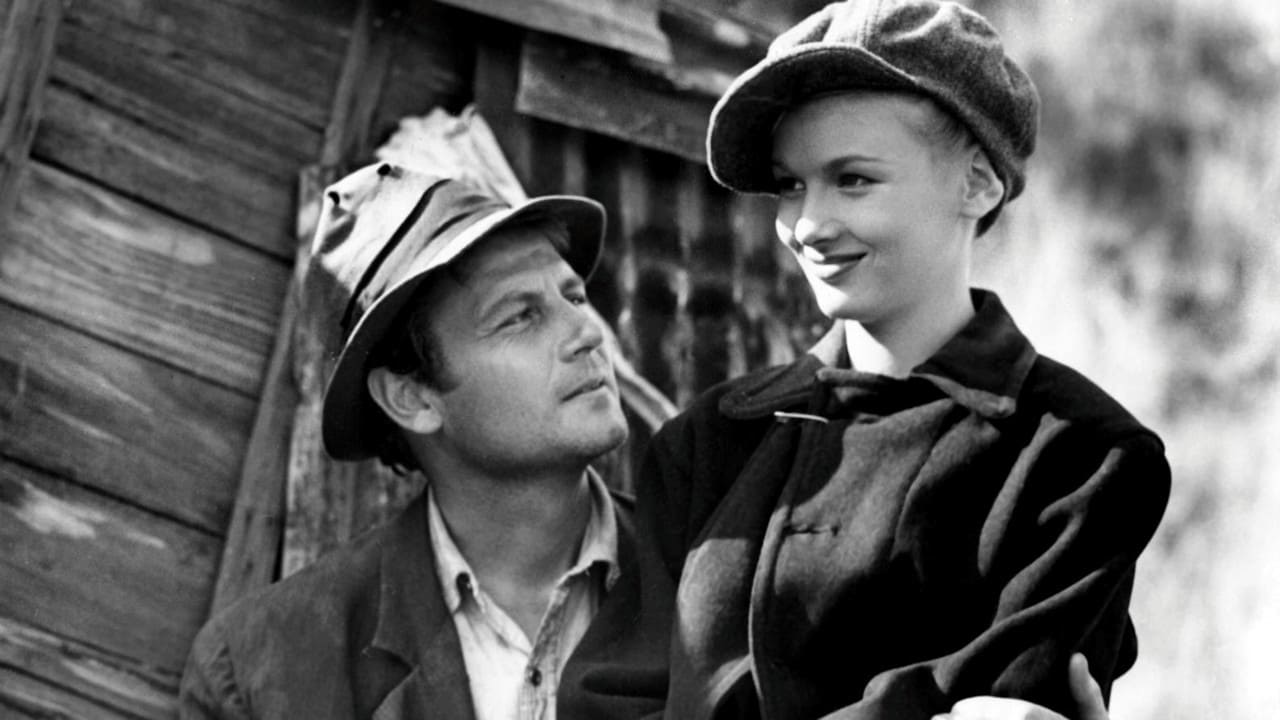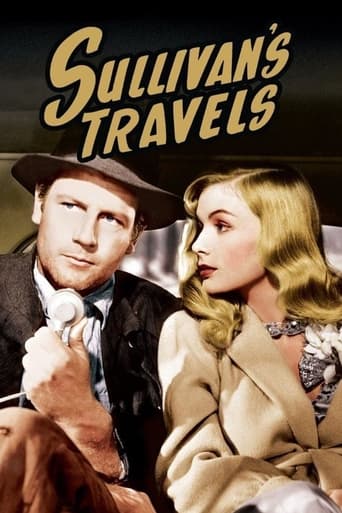

Good concept, poorly executed.
... View MoreDon't Believe the Hype
... View MoreCrappy film
... View MoreIn other words,this film is a surreal ride.
... View MoreLight Screwball Comedy with a heavy dark streak and a scintillating Veronica Lake Screwball comedies with absurd premises and popular stars were a staple of thirties Hollywood to help make people temporarily forget the misery of the great depression. Sullivan's Travels made at Paramount in 1941 when World War II was already raging in Europe was one of the last of the genre, and one of the most lasting. A film I have heard about for ages but was only able to catch now at a single night film club screening. The film starts out on a fluffy slapstick footing until the delayed appearance of Veronica Lake almost a quarter of the way through, but then takes off into classic space. Going in Joel McCrae, 36, was the big star but after this he was outshone by Lake who stole the show with her timely wisecracks, cascades of platinum blonde hair and sheer youthful beauty --she was nineteen at the time! Lake went on to become one of the most popular wartime stars with her trademark peekaboo hairstyle. In this film the camera lingers lovingly on her incredible long wavy tresses in multiple scenes. One reason to hang in there. Lake plays a down on her luck rejected film actress wannabe -- hard to believe with her looks! -- who offers McCrae a meal in a rusty spoon diner -- - but Sullivan realizes her potential and drops his hobo act taking her back to his Hollywood estate. There she pushes him into the pool to punish him for trying to pull the wool over her eyes. All others follow suite and take amusing tumbles fully clothed into the drink. From here she joins him in his hobo travels with a borderline risqué roll in the hay of a freight train they gave hopped in true hobo style. Having learned what he needs to know about trouble from the bums met along the way Sullivan decides to reward all by handing out five dollar bills. One vicious tramp clobbers him and takes all the money and steals his shoes (which contain his real I.D, sewn into the soles) whereupon Sullivan wakes up in a freight yard and clobbers a railway guard in self defense. For assaulting an officer and refusing to reveal his name in court he is sentenced to hard labor in a chain gang. Here the comedy veers into deadly serious territory. By a quirk of his ID. found concealed in the exchanged shoes Director Sullivan is reported dead, not the hobo who stole his shoes and then got killed by a train, whereupon his retinue including Lake all go into deep mourning. Meanwhile, as a respite from their hard labors the chained prisoners are granted a night of watching movies in a Negro church. The film is a cartoon featuring Pluto the dog and brings roars of laughter from the forlorn chain gangers. Now comes the most touching scene in the entire picture. Sympathizing with the desperate plight of the weary chain gang the Preacher of the congregation (tremendous black actor, Jess Lee Brooks -- inexplicably Uncredited ! ) leads the gathering of worshipers in a stirring rendition of the Negro spiritual, "Go down Moses -- Let my people Go!" Subsequently, with the help of an older chain gang convict, Sullivan hits upon the idea that will lead to his salvation and release. Can't give such a potential spoiler away. here, Suffice it to say that all's well that ends well, but the last scene is a serious comment on the importance of laughter. Sullivan, it might be observed, is named after John L. Sullivan, one of the most famous heavyweight boxing champions of the early century with implications that the director played by McCrea, is the kind of champion the downtrodden need while the implied critique of chain gang justice is no mere throwaway joke. All in All Sullivan's Travels, if not quite a masterpiece, is a unique film of it's kind -- a hilarious comedy with a serious message of the need for humor to see us through the darkest of times. . Not to mention the solid arrival of that amazing blonde bombshell, Veronica Lake. In her very next film, "This Gun For Hire", She received top billing above newcomer Alan Ladd, then went on to make six more films with Ladd, one of which, "The Blue Dahlia" will be shown next week in the Upcoming Noir festival at the Egyptian. Most unfortunately Ms. Lake's career did not last long after this and was basically cut short by a combination of alcohol and a disastrous private life. She ended up working as an unsung bar room waitress and died broke at fifty in 1973 of acute hepatitis. SULLIVAN'S TRAVELS, 1941 Review By Alex Deleon <filmfestivals.com> Viewed at Egyptian Theater, Hollywood. April 11, 2018
... View MoreFrom a sociological standpoint it certainly loses in power and sharp dissection of North America's problems -which certainly had grown since 1932, to 'I Am a Fugitive From a Chain Gang'. Given, Warner Bros. has always been the studio of the 'working man' and does have more authority on the subject.Paramount seems to understand their precarious position to speak about poverty and what was in fact 'legal slavery' in the chain gang system, as the whole film could be read as a argumentation for the continued production of comedies while the whole world burned: "Laughing should not be underestimated, for some people it is all they have". They certainly were not alone in this disposition; Goebbels also made sure comedies kept being made in Nazi Germany to reassure the German public all was well with the Third Reich and the war. Note that I am not trying to compare Paramount to the Nazi media policy, just naming the best example that this argument was used in many countries at the time.The film still shows the major influence religion had on any kind of narrative form, as good deeds are highly rewarded (the charitable girl played by Veronica Lake, the shop owner who gives them free doughnuts and coffee) and those who do evil are severely, and immediately, punished ( the greedy homeless person who robs Sullivan ). Plus African Americans get -what must be rare at that time in the united States, a positive representation, yet only because they are religious; God apparently solved the racial issues (weird how they still seem to exist today, wonder when they came back?).So in all, Paramount could not help those unfortunate victims who suffered the indirect effects of the war, they could at least still make them laugh.
... View Moreexcellent movie that we can easily proclaim a masterpiece. before i go into it...i want to tell you how proud i am to be Canadian. the bickering and hate love of whits and blacks is so infantile and gross. it has been going on for years...stop it already. the black man on the yacht car was not laughed at because of being black.....it was his situation that was funny. one other person said how can grown men laugh at a mickey mouse film....darn it they hadn't seen films for months and were locked up in the dark. veronica lake for the first time surprised me....she is small i see it now. an OK actress who was beginning to show promise but it didn't last. Joel a super star that rendered his role real well. superb supporting cast....and a top notch storyline and director Preston sturges
... View MoreWe heard lots about 'Gulliver's Travels', so what is this 'Sullivan's Travels'? Well a similar kind theme that sets in the modern world (when the movie was made) where a wealthy man, Sullivan willingly takes an adventure to study about the lives on the streets as a homeless. Yes, both the titles are about the journey of self discovery. A well made movie with a fine pair of characters in the lead.John Sullivan, a film director who opposes his producers' idea of making his next feature as a comedy. Instead, he wanted to adapt the famous novel 'O Brother, Where Art Thou?' which determines the realistic social issues. So the question arises that how much he's experienced to take the challenging project in the hand. Now he has to discover himself everything before coming to any conclusion. So then the life changing adventure begins till he gets all the answer he wanted with a little twist at the end.It was good to know that the movie with a concept like this was made almost 70 years ago and still looks fresh and original. As expected the adventure I was taking about was not completed in one long ran instead it split into many pieces. That is the thing that irked me the most in few parts of the movie. Otherwise, it would have been a masterpiece according to the my taste in film viewing.I would have liked it better if the story was flavoured with little sentiments in those adventure parts. Although it is a comedy movie which entertains well. But still the last 20 minutes or so were the excellent which also partially reminded the 86th Academy Award winner that based on the true story. In other word the last quarter of the movie was the best part you will find in all over the storytelling. As per my conclusion about the movie, it is not a must see movie, though if you wish to watch, you won't regret in seeing it.
... View More